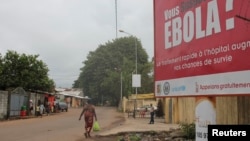Guinea authorities have implemented a quarantine this week aimed at finally ending the spread of Ebola in the country's coastal region, the one area where the virus continues to claim lives.
Three towns were quarantined in the Forecariah district, where the Ebola outbreak has persisted for more than a year.
Mohamed Camara, who's coordinating Forecariah's fight against Ebola, said the quarantine was implemented after residents of Dixinn Bouramaya, Kolota and Tamaranci voluntarily agreed to stay at home for 21 days.
The government and its partners agreed to supply food and free medicine, along with surveillance of people's movements, Camara said.
Authorities have also warned that anyone hiding Ebola patients will be arrested and put on trial.
A small number of Ebola cases remain in both Guinea and Sierra Leone, though the disease has disappeared from neighboring Liberia.
Guinea's first large quarantine
This is the first time the Guinean government has quarantined a large area since the regional outbreak began in December 2013.
International partners say the coastal region is the only part of Guinea where the Ebola virus has not been contained.
However, several people who came in contact with Ebola are reported to have fled the region. Most are said to have gone to the capital, Conakry. Searches are under way to track them down.
Six new cases of Ebola have just been reported in the commune of Matam in Conakry. Hospital sources say all six people contracted the virus through a woman who fled Forecariah and later died in the capital.
Authorities are expected to register people in all neighborhoods to ensure that everybody stays comfortably at home until 21 days have passed.
After the quarantine's imposition, the mood in the town of Forecariah was joyful. Residents said of the quarantine stops the spread of Ebola in the region, the stigmatization they face will be over.
In a previous version of this story, international relief official Robert Olivier was incorrectly identified as a spokesman for the relief organization Doctors Without Borders. VOA regrets the error.




